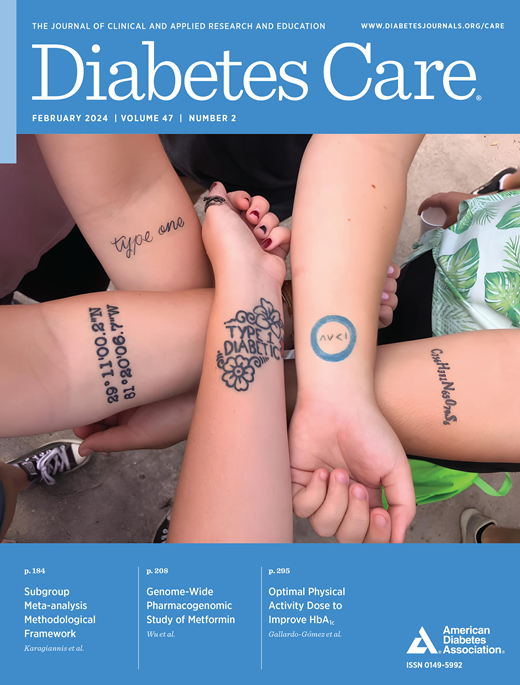Longitudinal Change in Serum Neurofilament Light Chain in Type 2 Diabetes and Early Diabetic Polyneuropathy: ADDITION-Denmark
IF 14.8
1区 医学
Q1 ENDOCRINOLOGY & METABOLISM
引用次数: 0
Abstract
OBJECTIVE To investigate the longitudinal development of neurofilament light chain (NfL) levels in type 2 diabetes with and without diabetic polyneuropathy (+/−DPN) and to explore the predictive potential of NfL as a biomarker for DPN. RESEARCH DESIGN AND METHODS We performed retrospective longitudinal case-control analysis of data from 178 participants of the Anglo-Danish-Dutch Study of Intensive Treatment in People with Screen-Detected Diabetes in Primary Care-Denmark (ADDITION-Denmark) cohort of people with screen-detected type 2 diabetes. Biobank samples acquired at the ADDITION-Denmark 5- and 10-year follow-ups were analyzed for serum NfL (s-NfL) using single-molecule array, and the results were compared with established reference material to obtain NfL z-scores. DPN was diagnosed according to Toronto criteria for confirmed DPN at the 10-year follow-up. RESULTS s-NfL increased over time in +DPN (N = 39) and −DPN participants (N = 139) at levels above normal age-induced s-NfL increase. Longitudinal s-NfL change was greater in +DPN than in −DPN participants (17.4% [95% CI 4.3; 32.2] or 0.31 SD [95% CI 0.03; 0.60] higher s-NfL or NfL z-score increase in +DPN compared with −DPN). s-NfL at the 5-year follow-up was positively associated with nerve conduction studies at the 10-year follow-up (P = 0.02 to <0.001), but not with DPN risk. Areas under the curve (AUCs) for s-NfL were not inferior to AUCs for the Michigan Neuropathy Screening Instrument questionnaire score or vibration detection thresholds. Higher yearly s-NfL increase was associated with higher DPN risk (odds ratio 1.36 [95% CI 1.08; 1.71] per 1 ng/L/year). CONCLUSIONS Our findings suggest that preceding s-NfL trajectories differ slightly between those with and without DPN and imply a possible biomarker value of s-NfL trajectories in DPN.2 型糖尿病和早期糖尿病多发性神经病变患者血清神经丝轻链的纵向变化:丹麦
目的 研究伴有和不伴有糖尿病多发性神经病变(+/-DPN)的 2 型糖尿病患者神经丝蛋白轻链(NfL)水平的纵向发展,并探索 NfL 作为 DPN 生物标记物的预测潜力。研究设计与方法 我们对 "盎格鲁-丹麦-荷兰初级保健筛查出的糖尿病患者强化治疗研究-丹麦"(ADDITION-Denmark)队列中筛查出的 2 型糖尿病患者的 178 名参与者的数据进行了回顾性纵向病例对照分析。在ADDITION-Denmark的5年和10年随访中获得的生物库样本采用单分子阵列对血清NfL(s-NfL)进行了分析,并将结果与既定参考材料进行比较,以获得NfL z-分数。根据多伦多确诊 DPN 的标准,对随访 10 年的 DPN 进行诊断。结果 随着时间的推移,+DPN(39 人)和-DPN 参与者(139 人)的 s-NfL 均有所增加,其水平高于正常年龄引起的 s-NfL。5年随访时的s-NfL与10年随访时的神经传导研究呈正相关(P = 0.02至<0.001),但与DPN风险无关。s-NfL的曲线下面积(AUC)并不低于密歇根神经病变筛查工具问卷评分或振动检测阈值的AUC。s-NfL 年增长率越高,DPN 风险越高(每 1 纳克/升/年的赔率为 1.36 [95% CI 1.08; 1.71])。结论 我们的研究结果表明,患有和未患有 DPN 的患者之前的 s-NfL 轨迹略有不同,这意味着 s-NfL 轨迹在 DPN 中可能具有生物标记价值。
本文章由计算机程序翻译,如有差异,请以英文原文为准。
求助全文
约1分钟内获得全文
求助全文
来源期刊

Diabetes Care
医学-内分泌学与代谢
CiteScore
27.80
自引率
4.90%
发文量
449
审稿时长
1 months
期刊介绍:
The journal's overarching mission can be captured by the simple word "Care," reflecting its commitment to enhancing patient well-being. Diabetes Care aims to support better patient care by addressing the comprehensive needs of healthcare professionals dedicated to managing diabetes.
Diabetes Care serves as a valuable resource for healthcare practitioners, aiming to advance knowledge, foster research, and improve diabetes management. The journal publishes original research across various categories, including Clinical Care, Education, Nutrition, Psychosocial Research, Epidemiology, Health Services Research, Emerging Treatments and Technologies, Pathophysiology, Complications, and Cardiovascular and Metabolic Risk. Additionally, Diabetes Care features ADA statements, consensus reports, review articles, letters to the editor, and health/medical news, appealing to a diverse audience of physicians, researchers, psychologists, educators, and other healthcare professionals.
 求助内容:
求助内容: 应助结果提醒方式:
应助结果提醒方式:


